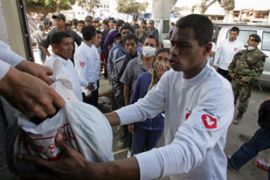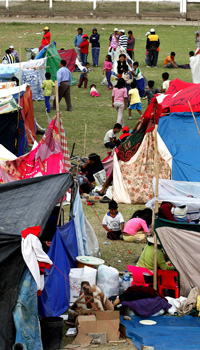Peru president threatens curfew
Garcia says he will use the “harshest measures” to stop chaos after the earthquake.

Published On 19 Aug 2007
But a government statement said that 1,000 troops have been sent to assist 2,000 police patrolling the streets in Pisco, Chincha, Ica and Canete, with orders to “deal firmly” with looting and plundering.
Carlos Vallejos, the health minister, said that around 1,500 physicians and nurses were struggling to prevent the spread of disease among earthquake victims in the coastal city of Pisco, 240 km southeast of Lima.
Death toll
On the third day after the massive 8.0 magnitude earthquake struck on Wednesday, the official death toll remained at 500 and more than 1,600 injured.
 |
| Hundreds of thousands of people have been made homeless [AFP] |
The number of missing is still unknown, and lacking official figures, news media estimate the number of people affected by the quake at 200,000.
A government statement said 1,000 troops have been sent to the southeast of Peru.
Around two-thirds of Pisco was destroyed, leaving many of its 130,000 inhabitants homeless and an unknown number of dead still beneath the rubble of collapsed homes, shops and other buildings.
People looted trucks carrying food and water, with some trying to break into the air force base where relief efforts have been centralised.
In the provincial capital of Ica and nearby Chincha, soldiers and police have broken up desperate crowds of people.
More than 600 inmates who escaped from a collapsed prison in Chincha remain on the loose.
Physical order
Garcia, at the Pisco airbase, said he was determined to prevent chaos.
“My obligation is to impose order, and order we will impose today, whatever the cost,” he said.
He said if preventive measures were not enough, “then energetic and physical order shall be imposed”.
Peru’s geophysical institute reported more than 400 tremors following the quake, which was the most devastating to hit the country since 1970.
Vallejos said his attention was now turned to respiratory problems, tetanus and diarrhoea and cholera.
He said: “The problem is not only that there are still unfound bodies, the problem is water.”
Source: News Agencies